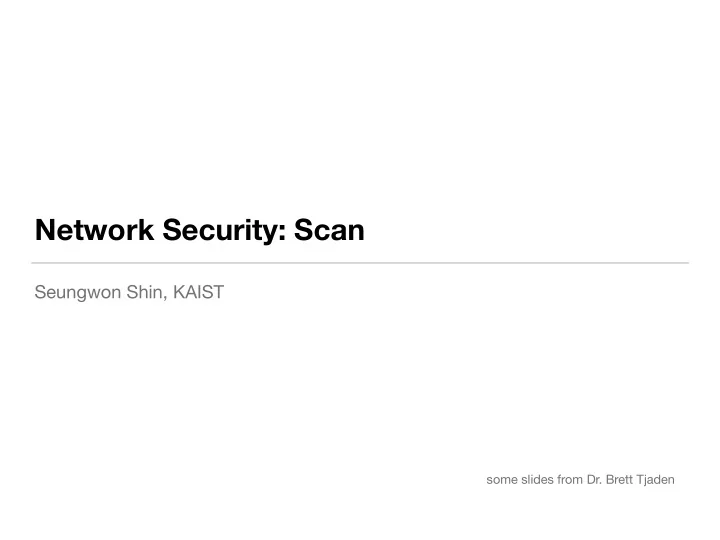

Network Security: Scan Seungwon Shin, KAIST some slides from Dr. Brett Tjaden
More about Scan
Scan Techniques Network scanning where is a target? which service is available on a target? can I have more information? Vulnerability scanning which vulnerable services are running on a target?
ICMP Scan ICMP protocol used by network devices, like routers, to send error messages indicating, for example, that a requested service is not available or that a host or router could not be reached several types type 8 echo request ping packet type 13 timestamp request from nmap.org type 15 information request RARP , BOOTP (rarely used) type 17 subnet address mask request find the subnet mask used by the target host
ICMP Scan Example Nmap send ping packet not so effective ICMPScan a bulk scanner that sends type 8, 13, 15, and 17 messages example icmpscan -c -t 500 -r 1 192.168.1.0/24 c: enable promiscuous mode t: timeout for probe response (ms) r: retries for each probe xprobe2 can do OS fingerprinting with ICMP example xprobe2 -v 192,168.0.174
xprobe2 example
How xprobe2 works How to fingerprint use OS specific implementation of TCP/IP stack 14:42:36.105884 IP (tos 0x6, ECT(0) , ttl 64 , id 19475, offset 0, flags [DF], proto: ICMP (1), length: 84) 192.168.0.4 > 192.168.0.101 : ICMP echo request, id 19639, seq 1, length 64 14:42:36.107486 IP (tos 0x0, ttl 128 , id 59791, offset 0, flags [DF], proto: ICMP (1), length: 84) 192.168.0.101 > 192.168.0.4 : ICMP echo reply, id 19639, seq 1, length 64 Linux Windows XP SP2 192.168.0.101 192.168.0.4 Linux 192.168.0.100 14:45:59.273678 IP (tos 0x6, ECT(0) , ttl 64 , id 49892, offset 0, flags [DF], proto: ICMP (1), length: 84) 192.168.0.4 > 192.168.0.100 : ICMP echo request, id 22065, seq 1, length 64 14:45:59.275212 IP (tos 0x6, ECT(0) , ttl 64 , id 56932, offset 0, flags [none], proto: ICMP (1), length: 84) 192.168.0.100 > 192.168.0.4 : ICMP echo reply, id 22065, seq 1, length 64
TCP Scan usual connect( ) call scan half-open TCP SYN scan kind of stealthy inverse TCP flag scan ACK flag scan TCP fragmentation scan with the help of a third-party FTP bounce
Inverse TCP flag F/W and IDS will detect (or record) a SYN packet sent to some sensitive network ports e.g., port 80, 443, and etc An attacker can evade by sending FIN probe packet (FIN flag) XMAS probe (FIN, URG, and PUSH flag) NULL probe (no flags) TCP FIN packet to 80 attacker target if open: no response if closed: RST/ACK RFC 793: out of state packet to an open port - discard
FTP Bounce Scan Why do we need this? hide an attacker attacker 1. set up a connection 2. issue a PORT command 3. issue a LIST command 6. deliver the results FTP server 4. create a connection to the target 5. response from the target target
FTP Bounce Scan PORT 143.248.111.100:23 200 PORT command successful LIST 143.248.111.100:23 LIST 143.248.111.100:23 150 Opening ASCII mode data connection for the list 425 Can’t build data connection: Connection refused 226 transfer complete 23 closed 23 open
Others Some more useful tools whois dig nslookup web search and much more
Vulnerability Scan Vulnerability scanner an automated tool that scans hosts and networks for known vulnerabilities and weaknesses find which host is vulnerable to what Examples NESSUS now commercial product OpenVAS fork of NESSUS, open source Retina commercial product
Vulnerability Scan How it works Similar to virus scanning software: Contain a database of vulnerability signatures that the tool searches for on a target system Cannot find vulnerabilities not in the database New vulnerabilities are discovered often Vulnerability database must be updated regularly
Vulnerability Scan Find what Network vulnerabilities Host-based (OS) vulnerabilities Misconfigured file permissions Open services Missing patches Vulnerabilities in commonly exploited applications Web, DNS, and mail servers
Vulnerability Scan target GUI target Vulnerability Scanning Engine Database target Knowledge Base target Results target
OpenVAS • www.openvas.org
Case Study
Interesting Research Work A Quantitative Analysis of the Insecurity of Embedded Network Devices: Results of a Wide-Area Scan written by Ang Cui and Salvatore J. Stolfo Columbia University Published in ACSAC 2012 Student Best Paper
Problem Domain and Goal Embedded Devices have been known that they are Insecure and available as a source for new, stealthy botnets Then, how to know if it is true A global scan method can be used in getting some clues
Approach Scan the world Identify Embedded Devices Scan the world’s largest cisco-IOS | web_cisco-web level_15_access | web_cisco-web Residential ISPs Linksys SPA Configuration | web_linksys-spa Commercial ISPs Linksys PAP2 Configuration | web_linksys-pap2 EDU, GOV etc SpeedStream Router Configurator | web_speedstream DD-WRT Control Panel | web_ddwrt Scan in United States Asia Europe Try the default password root: username_prompt: ['sername:'] username: ['cisco � ] askuser: true passstr: ['assword:'] incorrect: [sername, assword] success: ['\$', '\#', '>'] passwords: ['cisco � ] deviceType: cisco linesep: ''
Scan Recognizance scan large portions of the internet port 23 (telnet) and 80 (http) Identification try to connect all telnet and http servers detect their manufacturer and model of the device Verification try to log in with the default password
Result Distribution of vulnerable embedded devices total number: 540,435
Result Distribution of vulnerable embedded devices (types)
Result
Why is this important? – Router Exploitation • DIK (Da IOS Rootkit, Sebastian Muniz) – http://eusecwest.com/esw08/esw08-muniz.pdf • Router Transit Vulnerabilities (Felix Linder) – http://www.blackhat.com/presentations/bh-usa-09/LINDNER/BHUSA09-Lindner-RouterExploit- SLIDES.pdf • Reliable Cisco IOS Exploit (Felix Linder) – http://www.phenoelit-us.org/stuff/FX_Phenoelit_25c3_Cisco_IOS.pdf – Router Botnet • Network Bluepill – http://dronebl.org/blog • Keiten Bot – Helel Mod 1.0 – Ezba � Elohim – Runs on D-link routers – http://packetstormsecurity.nl/irc/kaiten.c
Some Extension When Firmware Modifications Attack: A Case Study of Embedded Exploitation NDSS, 2013 The State of Embedded-Device Security (Spoiler Alert: It's Bad) IEEE S&P Magazine, 2012 Shodan!
Shodan It is a search engine that allows you to look for devices connected to the internet mostly embedded devices webcam, wireless AP , and etc How to provide search results? scanning networks
Shodan
Shodan
Recommend
More recommend